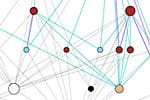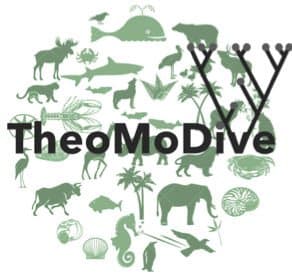EN - CTMB - Projects
-
2019-02-15
-
Last modifiedFriday, 14 August 2020
CBTM
Research Projects
Ecological Networks and Global Change Research Group
Introduction
 Welcome to the Ecological Networks and Global Change research group (EcoNetGC). We investigate the structure, dynamics and functioning of networks of species interactions, and the consequences of different components of global change on them. We study different network types (predator-prey, host-parasitoid, free-living mutualists, and bacterial symbionts and their hosts) and global change components (climate change, habitat loss). To answer our questions, we use a multidisciplinar perspective, using concepts, models and techniques from ecology, evolution, physics, genetics, or molecular biology. We adopt an integrative approach, combining mathematical and simulation models, analyses of large datasets, and manipulative experiments on mesocosms.
Welcome to the Ecological Networks and Global Change research group (EcoNetGC). We investigate the structure, dynamics and functioning of networks of species interactions, and the consequences of different components of global change on them. We study different network types (predator-prey, host-parasitoid, free-living mutualists, and bacterial symbionts and their hosts) and global change components (climate change, habitat loss). To answer our questions, we use a multidisciplinar perspective, using concepts, models and techniques from ecology, evolution, physics, genetics, or molecular biology. We adopt an integrative approach, combining mathematical and simulation models, analyses of large datasets, and manipulative experiments on mesocosms.
Research interests
- Structure, dynamics and fragility of ecological networks: We study the networks of interactions among species in different ecosystems. We search for universal patterns in their structure, which reflect evolutionary and ecological processes, and we also investigate the eco-evolutionary dynamics of these networks. Ecological networks are fundamental for predicting the effects of different perturbations that eventually trigger species extinctions.

- Ecology, evolution and robustness of microbe-host interaction networks : One of the biggest challenges in eco-evolutionary studies of species interaction networks is to introduce the largest component of biodiversity on Earth: prokaryotes. Using next-generation sequencing techniques, we are addressing this challenge. focusing on the fascinating complex system composed of sponge and corals hosts and their associated prokaryotes.

- Climate change effects on community structure and the carbon cycle: Climate change is real. There is ample evidence that ecological responses are already occurring at the individual species level. But scaling from populations through to communities, let alone ecosystems, will be challenging. We use ecological theory and manipulative mesocosm experiments to investigate the effects of climatic warming on community structure and ecosystem service supply.

- Network complexity and ecosystem functioning: Biodiversity loss and the disruption of species interactions affects the functioning of ecosystems. We investigate how changes in species interactions and species traits results in further changes on ecosystem functions, like pest control and the carbon cycle.

- Habitat loss and species invasion in ecological networks: Habitat loss and degradation is still the major cause of biodiversity loss worldwide. Invaders and exotic species are more likely to be established within degraded habitats containing less biodiversity. Using a network perspective, we are investigating theoretical and experimentally these combined effects and the resulting emerging ecosystems.

- The spatio-temporal dimension of ecological networks: Ecological networks are dynamic, although most studies use static versions of them to identify structural properties. This hampers our ability to tease apart natural network variation through time and space, in comparison to variation caused by human-induced disturbances as habitat loss or climate change. We investigate whether and how these patterns hold through different temporal (seasonal, interannual, deep-time) and spatial (local to global) scales.

The team
Jose M. Montoya is director of the Ecological Networks and Global Change Research Group, working with Technician Alexandre Garreau, Project Manager Dalila Booth, Postdoctoral fellows including Cara Faillace, Elvire Bestion, Alexios Synodinos and PhD students: Soraya Alvarez-Codesal and Ioar de Guzman.
The group is based at the Centre for Biodiversity Theory and Modelling, in the CNRS Theoretical and Experimental Ecology Station in Moulis, France.
TheoMoDive Research Group

Integrative theories and models for the study of biodiversity
Biodiversity loss is, alongside with climate change, one of the greatest challenges that societies will face during the present and following centuries. This is why integrative scientific approaches to study biodiversity are rising and links between research and decision-making are being strengthened by the recently created intergovernmental science-policy Platform on Biodiversity and Ecosystem Services.
However, the scientific community dedicated to the study of biodiversity does not yet have access to powerful integrative tools, such as those available to climatologists for predicting climate changes, like global circulation models.
Integrating multiple factors of biodiversity change, multiple taxonomic and functional groups, and the effects of biodiversity changes on the functioning and dynamics of ecological and social systems in biodiversity modelling is still a major scientific challenge.
Therefore, careful consideration of the relevance, feasibility and limitations of integrative predictive biodiversity models is needed.
The Groupement De Recherche Théorie et Modélisation de la Biodiversité - GDR TheoMoDive ("Theory and Modelling of Biodiversity” Research Group) has been set up to provide the French scientific community with a platform where different approaches can be assessed and the research efforts of different groups can be coordinated to catalyse the elaboration of a solid body of fundamental theory, as well as predictive models of biodiversity changes and their impacts on ecological and social systems.
TheoMoDive’s main themes of research are centred on a few hot topics, in which the French scientific community has specific strengths. The working groups linked to these themes bring together research teams that are at the forefront of theoretical research on these topics internationally.
By stimulating scientific debates, the confrontation of different theoretical developments and their application to empirical data, the TheoMoDive working groups aim to contribute to the emergence of more robust and powerful theories and models.
For more information, visit our website: https://sites.google.com/site/theomodive/